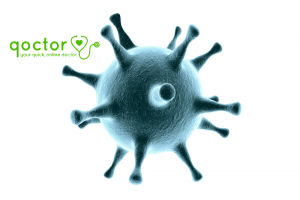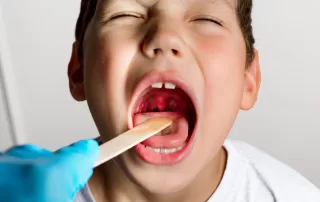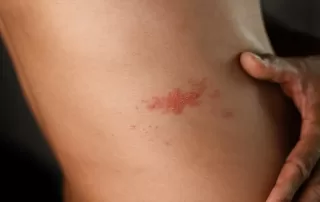Cold Sores
Welcome to Qoctor’s online doctor service which can provide assessment for Cold Sores. Answer some online questions, then book a consultation with an AHPRA-registered doctor. Repeats available (subject to assessment). Please also note, your pharmacist may be able to assist you with over the counter treatments for cold sore.
The consultation fee is $29.99. If a prescription is advised, it can be sent as an eScript to your phone OR electronically to your local pharmacy. Alternatively you can have medication delivered by an Australian partner pharmacy- in this case, the cost of medication is added at the checkout. All treatment and advice is issued subject to your doctor’s assessment.
About Cold Sores
Cold sores are caused by the Herpes Simplex Virus (HSV1), which is spread by skin to skin contact. About 1 in 5 people have cold sores that flare up from time to time. They usually get better without treatment in 7-10 days, though sometimes antiviral creams or tablets may be used to ease symptoms.

FAQs about HSV1 & cold sores
- Cold sores are caused by the Herpes Simplex Virus Type 1, otherwise known as HSV1.
- HSV2 is a similar virus which usually causes genital herpes, but rarely can also cause cold sores around the mouth.
- Cold sores are spread by skin to skin contact, such as kissing someone who has an active cold sore.
- The first infection may not cause any symptoms, but may be triggered later.
- Cold sores can be triggered by stress, fatigue, viral illness, strong UV/sunlight exposure or during menstruation.
- Cold sores are spread by skin to skin contact
- If you have active cold sores you should avoid newborn babies, elderly, or anyone with a weak immune system (e.g on chemotherapy)
- If you have no active cold sores, you’re not usually infectious to others.
- No, usually you do not need any tests to diagnose cold sores.
- The diagnose tends to be obvious, based on history and the appearance of the lesions
- However, if there’s any doubt, your GP can perform a swab and send it to the laboratory for analysis for HSV1.
• People with recurring cold sores occasionally worry that there’s something wrong with their immune system, or that they’re deficient in a vitamin or mineral. But cold sores are very common, and most people who get them are otherwise perfectly well.
• Sometimes tiredness or another viral illness can make you more prone to cold sore flare ups
• If you’re worried, speak to your doctor- they may recommend some general blood tests to check for an underlying cause.
• Usually no particular medication for cold sores is recommended- they naturally get better over 7-10 days.
• There is some general advice when you have active cold sores, such as avoid touching the cold sores; wash hands regularly especially after applying creams or before putting in your contact lenses; and don’t share lip balm or sunscreen.
• Over the counter painkillers like Panadol and Nurofen, or topical anaesthetic gels (e.g Lidocaine) may be helpful for pain/discomfort.
• Antiviral Creams can be bought at your pharmacy- these do not kill the virus but prevent it from multiplying which may reduce symptoms a little.
• Oral antiviral medication may be prescribed to reduce the severity of symptoms, in some suitable cases. This approach may be appropriate if you have severe or frequent cold sores, or a weakened immune system for some reason- speak to your doctor for further advice.
Once you’ve been infected, HSV1 stays in your body. In some people it means cold sores flare up from time to time, in others HSV1 lies dormant, and flares up rarely or not at all.
Health Library- Cold Sores (HSV1)
Is Tonsillitis Contagious?
Is Tonsillitis Contagious? (and other common questions about sore throats!) Tonsillitis, an inflammation of the tonsils, raises a common question: is it contagious? Caused by viruses or bacteria, tonsillitis can indeed be spread through airborne droplets, personal contact, and shared items. Understanding its contagious nature and implementing preventive measures is crucial for reducing its transmission and safeguarding public health. What is Tonsillitis? Tonsillitis is inflammation of the tonsils, which are the two oval-shaped lumps of tissue, located at the back of your throat. It's a common condition, particularly among children, and can present with the following symptoms: Sore throat or “scratchy throat” Pain when swallowing Enlarged tonsils, sometimes with white spots or yellow/white/grey-ish coating Fever Tender, enlarged lymph nodes around the neck area Upset stomach (tummy pain or vomiting) Tonsillitis can be caused by a virus or bacteria. The most common bacterial [...]
A Guide to Shingles Vaccination in Australia
A Guide to Shingles Vaccination in Australia Herpes zoster, known as shingles, is caused by the reactivation of the varicella-zoster virus, the same virus responsible for chickenpox. In Australia, significant strides have been made in preventing this painful condition through effective vaccination strategies. Understanding shingles Shingles typically presents as a painful rash that may blister and can appear anywhere on the body but often forms a single stripe on either side of the torso. It is caused by the reactivation of the varicella-zoster virus in individuals who have recovered from chickenpox. Risk factors for developing shingles include age, weakened immunity, and physical or emotional stress. In response to the increased risk of shingles and its complications among older adults and immunocompromised individuals, the Australian National Immunisation Program (NIP) recommends vaccination in certain groups of people: Shingrix Vaccine: For Immunocompetent Adults: Adults [...]
How to treat Head Lice
How to treat Head Lice What are Head Lice? Head Lice are small insects that live in human hair and feed on blood from the scalp. Outbreaks are very common in childcare centres, schools and residential facilities. How do Head Lice spread? Head Lice are spread by close head-to-head contact. Less commonly they can spread by sharing items such as a hairbrushes, combs or pillows. The types of lice that live on other animals do not infect humans. Head Lice do not have wings, so they crawl from place to place- they cannot fly or jump from one person to another. Request a medical certificate Are Head Lice a sign of poor hygiene? No. Anyone can get Head Lice! And, whilst Head Lice can cause itch and discomfort, they do not carry or spread any diseases. How do [...]



